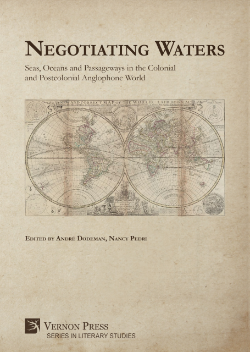Negotiating Waters
Negotiating Waters: Seas, Oceans and Passageways in the Colonial and Postcolonial Anglophone World. Ed. André Dodeman and Nancy Pedri. Vernon Press, 2020.
 Negotiating Waters: Seas, Oceans and Passageways in the Colonial and Postcolonial Anglophone World examines how seas, oceans, and passageways have shaped and reshaped cultural identities, spurred stories of reunion and separation, and redefined entire nations. It explores how entire communities have crossed seas and oceans, voluntarily or not, to settle in foreign lands and underwent identity, cultural and literary transformations. It also explores how these crossings are represented. The book thus contributes to oceanic studies, a field of study that asks how the seas and oceans have and continue to affect political (narratives of exploration, cartography), international (maritime law), identity (insularity), and literary issues (survival narratives, fishing stories).
Negotiating Waters: Seas, Oceans and Passageways in the Colonial and Postcolonial Anglophone World examines how seas, oceans, and passageways have shaped and reshaped cultural identities, spurred stories of reunion and separation, and redefined entire nations. It explores how entire communities have crossed seas and oceans, voluntarily or not, to settle in foreign lands and underwent identity, cultural and literary transformations. It also explores how these crossings are represented. The book thus contributes to oceanic studies, a field of study that asks how the seas and oceans have and continue to affect political (narratives of exploration, cartography), international (maritime law), identity (insularity), and literary issues (survival narratives, fishing stories).
Divided into three sections, Negotiating Waters explores the management, the crossings, and the re-imaginings of the seas and oceans that played such an important role in the configuration of the colonial and postcolonial world and imagination. In their careful considerations of how water figures prominently in maps, travel journals, diaries, letters, and literary narratives from the 17th century onwards, the three thematic sections come together to shed light on how water, in all of its shapes and forms, has marked lands, but also nations and identities. They thus offer readers from different disciplines and with different colonial and postcolonial points of interests the possibility to investigate and discover new approaches to maritime spaces. By advancing views on how seas and oceans exert power through representation, Negotiating Waters engages in important critical work in an age of rising concern about maritime environments.
Table of Contents
Dodeman, André and Nancy Pedri. "Introduction." 4-23.
Part 1: Collecting Water
Zukas, Alex. "Negotiating Oceans, Islands, Continents, and British Imperial Ambitions in the Maps of Herman Moll, 1697-1732." 25-55.
Kantarbaeva-Bill, Irina. "Journeys to the Source of the River Oxus: Victorian Desires, Colonial Texts." 57-68.
Charman, Caitlin. "Newfoundland's Robison Crusoe?: Mobility, Masculinity, and the Failure of Ecological Management in Michael Crummy's Sweetland." 69-88.
Part 2: Crossing Water
Tendil, Jean-Luc. "William Braford's Of Plimoth Plantation: Crossing the Ocean, Travelling between Two Poles of Being." 90-103.
Semple, Rhonda. "'Whatever Passes through the Paths of the Sea' (psalm 8:8): Shipboard Liminality and the Sea Voyage as the Crucible of Missionary Identity from the 1820s to the 1920s?" 104-122.
Rademacher, Marie Gérardine. "Crossing the Sea: Marie Stopes' Expedition to the Northern Wilds of Japan as Expression of Transcontinental Contacts and Cultural Exchange." 123-138.
Inerlude: Interview with Lisa Moore. 139-153.
Part 3: Reimagining Water
Stefanova, Svetlana. "Waterways and Ships as Heterotopias of Memory in Caryl Phillips'
Narratives." 155-172.
Catherlain, Neela. "The Poetics of Water in Ghosh's Ibis Trilogy" 173-188.
Vincent, Suhasini. "Material Ecocriticism: Maritime Trade, Displacement, and the Environment in Amitav Ghosh's Fictional Waterscape." 189-205.
Perrin, Claire. "Negotiating Water in Times of Drought: An Ecocritical Study of Cli-fi Novels Paolo Bacigalupi's The Water Knife and Benjamin Percy's Dead Lands." 206-225.